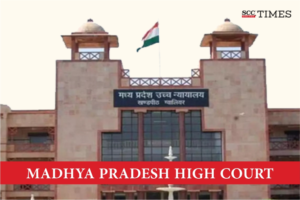Madhya Pradesh High Court: In a petition filed under Section 482 of the Criminal Procedure Code, 1973 (CrPC) by the applicants, including MP Shivraj Singh Chouhan, to quash the Judicial Magistrate’s order initiating defamation proceedings against them based on private complaint made by Vivek Krishna Tankha, a senior advocate and Member of Parliament (MP), a single-judge bench of Sanjay Dwivedi, J., held that the issue of evidence admissibility should be determined during the trial, not at the preliminary stage of complaint registration and upheld the Judicial Magistrate’s order issuing summon and initiating defamation proceedings.
Factual Matrix
In the instant matter, the respondent filed a defamation case against the applicants (political figures and representatives of constituencies in Madhya Pradesh) for making defamatory remarks about him in the media. The respondent stated that the statements portrayed him as opposing OBC reservation, allegedly for political gain. The respondent stated that he had represented a petitioner in a legal matter regarding delimitation and rotation for Panchayat elections in Madhya Pradesh, not related to OBC reservation. The respondent claimed that, despite their knowledge, the applicants distorted the legal proceedings to malign him. On 23-12-2021, applicant 3 purportedly tweeted defamatory content, when the respondent had already held a press conference to clarify his position on 21-12-2021.
The Judicial Magistrate Class-I/Special Judicial Magistrate (M.P./M.L.A. Court), Jabalpur, vide order dated 20-01-2024, initiating defamation proceedings against the applicants. Aggrieved by the impugned order, the applicants filed the present petition seeking quashment of the same.
Moot Point
-
Whether alleged defamatory statements made in media can constitute criminal defamation when based on published materials and social media content?
-
Whether the evidence presented in support of the defamation complaint legally admissible for the magistrate to take cognizance?
-
Whether a prima facie case of defamation under Sections 499 and 500 of the IPC has been established based on the petitioners’ public statements and media coverage?
Parties’ Contentions
The applicants contended that the materials provided in support of the complaint (e.g., newspaper clippings and social media posts) were inadmissible as evidence and should not justify cognizance of a defamation complaint. It was contended that under Section 81 of the Evidence Act, newspapers are only secondary evidence and must be substantiated by testimony or certificates, as per Section 65B for electronic records. The applicants placed reliance on Nagawwa v. Veeranna Shivalingappa Konjalgi, (1976) 3 SCC 736, where the Supreme Court sets criteria for quashing complaints and argued that the magistrate’s decision to issue summons was arbitrary and based on inadequate or irrelevant evidence. They also cited Laxmi Raj Shetty v. State of T.N., (1988) 3 SCC 319 and Quamarul Islam v. S.K. Kanta, (1994) Supp (3) SCC 5, and highlighted that newspaper reports are hearsay and lack evidentiary value if uncorroborated.
However, the respondent contended that the material presented sufficed to establish a prima facie case, with the admissibility of evidence to be determined at trial, not at the cognizance stage. It was contended that Section 81 of the Evidence Act presumes documents, such as newspapers, to be genuine, leaving objections to their authenticity or relevance for trial. It was argued that the petitioners had notice of the defamation allegations and had not denied making the statements in question.
Court’s Analysis
The Court referred to Nagawwa v. Veeranna Shivalingappa Konjalgi, (Supra), where the Supreme Court set out parameters for courts when issuing summons, including:
-
Whether the complaint or statements of witnesses disclose essential ingredients of an offense.
-
Whether the allegations are inherently improbable.
-
Whether the magistrate’s decision to issue process is capricious or based on irrelevant materials.
-
Whether the complaint suffers from legal defects, such as lack of sanction or absence of a competent complainant.
The Court noted that, per the Supreme Court’s guidance in Nagawwa (Supra), the discretion of the magistrate should only be interfered with in clear cases of capricious or baseless issuance of summons. However, the Court noted that the evidence, even if challenged for admissibility, could not be dismissed at the initial stage.
The Court cited the Fifth Exception to Section 499 of the IPC, which allows certain opinions expressed in good faith about judicial matters. The Court cited Suramanian Swamy v. Union of India, (2016) 7 SCC 221, which indicated that whether a statement qualifies under this exception requires a factual trial to assess good faith and public interest. The Court also referred to Chaman Lal v. State of Punjab, (1970) 1 SCC 590, and asserted that the issues related to public good and good faith, pertinent to defamation cases under Section 499 IPC, require factual determination at trial.
“Public good is a question of fact. Good faith has also to be established as a fact.”
The Court agreed with the respondent’s view, and noted that at the stage of issuing summons, the trial court is not required to determine the admissibility of evidence. Instead, the Court must only ascertain whether there is sufficient material to proceed with the case and the trial will determine the admissibility and credibility of the evidence.
Court’s Decision
The Court dismissed the petition, upheld the trial court’s issuance of summons and allowed the case to proceed to trial for a full examination of evidence and the determination of facts.
[Shivraj Singh Chouhan v. Vivek Krishna Tankha, 2024 SCC OnLine MP 7011, Decided on 25-10-2024]
Advocates who appeared in this case:
Shri Surendra Singh, Senior Advocate with Shri Akshat Arjariya, Shri Rohan Harne and Shri Karnik Jaggi, Counsel for the Applicants
Shri Kapil Sibbal, Senior Advocate with Shri H.S. Chhabra and Shri Shivendra Pandey, Counsel for the Respondent

